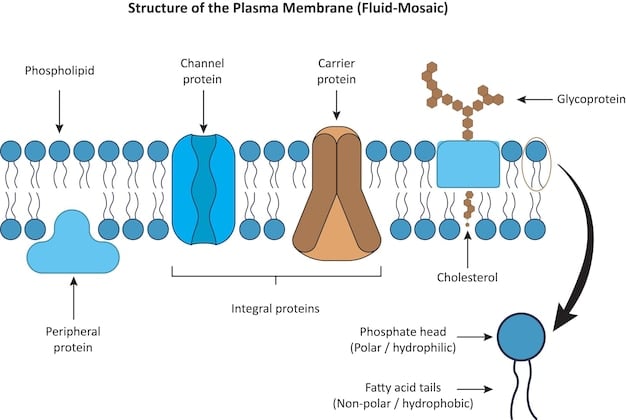Unlock Gut Health: A Guide to Dietary Fiber and Your Microbiome

Dietary fiber plays a crucial role in promoting gut health by influencing the composition and function of the gut microbiome, and different types of fiber have distinct effects on digestive processes.
Are you looking to improve your digestive health and understand the powerful connection between what you eat and how you feel? The answer might lie in the humble, yet mighty, dietary fiber and gut health: how different types of fiber impact microbiome composition and digestive function.
Understanding Dietary Fiber: The Basics
Dietary fiber is a type of carbohydrate that your body can’t digest. It’s found mainly in fruits, vegetables, whole grains, and legumes. Often referred to as roughage, fiber passes relatively intact through your stomach, small intestine, and colon and out of your body.
What Exactly is Dietary Fiber?
Unlike other carbohydrates, fiber isn’t broken down and absorbed into the bloodstream. Instead, it adds bulk to your diet, which can help you feel full faster and stay full longer. This can aid in weight management and prevent overeating.
There are two main types of dietary fiber: soluble and insoluble. Each type offers unique health benefits and affects your body differently.
Soluble vs. Insoluble Fiber
Soluble fiber dissolves in water to form a gel-like material. This type of fiber can help lower blood cholesterol and glucose levels. Insoluble fiber, on the other hand, doesn’t dissolve in water. It adds bulk to the stool, helping food pass more quickly through the stomach and intestines.
- Soluble Fiber: Dissolves in water, forms a gel, and can help lower cholesterol and glucose levels.
- Insoluble Fiber: Doesn’t dissolve in water, adds bulk to stool, and promotes regular bowel movements.
- Food Sources: Both types are found in plant-based foods, but in varying proportions.
Understanding the difference between soluble and insoluble fiber is crucial for tailoring your diet to meet your specific health needs.
In summary, dietary fiber is an essential component of a healthy diet. By understanding its different types and benefits, you can make informed choices to support your overall well-being.
The Gut Microbiome: A World Within
The gut microbiome refers to the trillions of bacteria, fungi, viruses, and other microorganisms that live in your digestive tract. These microbes play a vital role in your health, influencing everything from digestion to immunity.
Importance of Gut Microbiome Composition
A diverse and balanced gut microbiome is essential for optimal health. When the balance is disrupted—often due to poor diet, stress, or antibiotics—it can lead to various health issues, including digestive disorders, weakened immunity, and even mental health problems.
The gut microbiome aids in digesting food, synthesizing vitamins, and protecting against harmful pathogens. Its composition can be significantly influenced by your diet, particularly your fiber intake.
Factors Influencing Microbiome Health
Several factors can influence the health of your gut microbiome. Diet is one of the most significant, but other factors include age, genetics, lifestyle, and medication use.

- Diet: High-fiber, plant-based diets promote a diverse and healthy gut microbiome.
- Antibiotics: Can disrupt the balance of gut bacteria, leading to dysbiosis.
- Stress: Chronic stress can negatively impact the gut microbiome.
- Probiotics: Can help introduce beneficial bacteria into the gut.
Taking care of your gut microbiome is a long-term commitment that involves making conscious choices about your diet and lifestyle.
In conclusion, the gut microbiome is a complex ecosystem that significantly impacts your health. Understanding the factors that influence its composition is key to maintaining a healthy gut.
How Fiber Impacts Gut Microbiome Composition
Dietary fiber serves as a primary food source for the bacteria in your gut. Different types of fiber feed different species of bacteria, thereby influencing the overall composition of the gut microbiome.
Prebiotic Effect of Fiber
Many types of fiber act as prebiotics, meaning they promote the growth and activity of beneficial bacteria in the gut. When these bacteria ferment fiber, they produce short-chain fatty acids (SCFAs), which have numerous health benefits.
The prebiotic effect of fiber is crucial for fostering a balanced and thriving gut microbiome.
Specific Fibers and Their Effects
Different types of fiber have distinct effects on the gut microbiome. For example, resistant starch, found in cooked and cooled potatoes and rice, is fermented by bacteria in the colon, producing butyrate, an SCFA known for its anti-inflammatory properties.
- Resistant Starch: Promotes butyrate production, reducing inflammation.
- Inulin: Supports the growth of Bifidobacteria, known for their beneficial effects on gut health.
- Pectin: Can improve gut barrier function and reduce inflammation.
By incorporating a variety of fiber-rich foods into your diet, you can support a diverse and resilient gut microbiome.
In summary, dietary fiber plays a key role in shaping the gut microbiome by acting as a prebiotic and promoting the growth of beneficial bacteria.
The Role of Short-Chain Fatty Acids (SCFAs)
Short-chain fatty acids (SCFAs) are produced when gut bacteria ferment dietary fiber. These compounds play a significant role in gut health and overall well-being.
Production and Types of SCFAs
The main SCFAs produced in the gut are acetate, propionate, and butyrate. Each SCFA has unique effects on the body. Butyrate, for example, is a primary energy source for colon cells and has anti-inflammatory properties.
SCFAs are crucial for maintaining gut health and have far-reaching effects on the body.
Benefits of SCFAs for Gut Health
SCFAs offer numerous benefits for gut health. They help maintain the integrity of the gut lining, reduce inflammation, and regulate gut motility. Additionally, they can influence appetite and energy expenditure.
Here are some of the key benefits of SCFAs:
- Butyrate: Nourishes colon cells and reduces inflammation.
- Acetate: Affects appetite and energy expenditure.
- Propionate: Plays a role in glucose metabolism and cholesterol synthesis.
By supporting the production of SCFAs through a high-fiber diet, you can promote a healthy gut and improve overall well-being.

In conclusion, short-chain fatty acids are essential compounds produced by gut bacteria from dietary fiber. They offer numerous benefits for gut health and overall well-being.
Practical Tips for Increasing Fiber Intake
Increasing your fiber intake can seem daunting, but it can be easily achieved by making simple changes to your diet. Gradual adjustments are key to avoiding digestive discomfort.
Gradual Increase in Fiber Consumption
Start by slowly increasing your fiber intake to give your gut time to adjust. A sudden increase can lead to gas, bloating, and other digestive issues. Aim to increase your fiber intake by a few grams each day.
Gradually increasing your fiber intake is the best way to ensure your body can adapt comfortably.
Food Sources Rich in Fiber
Incorporate a variety of fiber-rich foods into your daily meals. Here are some excellent sources:
- Fruits: Berries, apples, pears.
- Vegetables: Broccoli, Brussels sprouts, carrots.
- Whole Grains: Oats, quinoa, brown rice.
- Legumes: Lentils, chickpeas, beans.
Easy Ways to Add Fiber to Your Diet
Here are some practical tips for adding more fiber to your diet:
- Add berries to your morning oatmeal or yogurt.
- Snack on raw vegetables with hummus.
- Choose whole-grain bread and pasta over refined grains.
- Include legumes in soups, salads, and stews.
Making small, consistent changes to your diet can significantly increase your fiber intake and improve your gut health.
In summary, increasing your fiber intake gradually and incorporating fiber-rich foods into your diet are simple steps you can take to improve your gut health.
Potential Pitfalls and How to Avoid Them
While increasing fiber intake is beneficial, it’s essential to be aware of potential pitfalls and how to avoid them. Common issues include digestive discomfort and nutrient absorption interference.
Digestive Discomfort
One of the most common issues when increasing fiber intake is digestive discomfort, such as gas, bloating, and constipation. This is often due to the gut not being accustomed to processing large amounts of fiber.
To avoid digestive discomfort, increase your fiber intake gradually and drink plenty of water.
Nutrient Absorption Interference
In some cases, very high fiber intake can interfere with the absorption of certain nutrients. This is more likely to be a concern if you have existing nutrient deficiencies or digestive issues.
To mitigate this, ensure you’re consuming a balanced diet and consider consulting with a healthcare professional if you have concerns about nutrient absorption.
Importance of Hydration
Drinking enough water is crucial when increasing your fiber intake. Fiber absorbs water, and insufficient hydration can lead to constipation and other digestive issues.
Aim to drink at least eight glasses of water per day, especially as you increase your fiber intake.
In conclusion, increasing fiber intake has many benefits, but it’s important to be aware of potential pitfalls and take steps to avoid them. Gradual increases, proper hydration, and a balanced diet are key to maximizing the benefits of fiber.
| Key Point | Brief Description |
|---|---|
| 🍎 Soluble Fiber | Helps lower cholesterol and glucose levels. |
| 🥦 Insoluble Fiber | Promotes regular bowel movements and adds bulk to stool. |
| 🦠 Gut Microbiome | Influenced by diet, affecting digestion and immunity. |
| 🧪 SCFAs | Produced from fiber fermentation, essential for gut health. |
Frequently Asked Questions
▼
Dietary fiber is a type of carbohydrate that the body cannot digest. It is found in plant-based foods like fruits, vegetables, whole grains, and legumes and is crucial for digestive health.
▼
Fiber acts as a prebiotic, feeding beneficial gut bacteria. This fermentation process results in the production of SCFAs, which provide energy for colon cells and reduce inflammation.
▼
SCFAs (short-chain fatty acids) are compounds produced when gut bacteria ferment fiber. They help maintain the integrity of the gut lining, reduce inflammation, and regulate gut motility.
▼
Gradually increase your consumption of fiber-rich foods such as fruits, vegetables, whole grains, and legumes. Small, consistent changes can help your gut adapt without discomfort.
▼
Potential issues include digestive discomfort, such as gas and bloating, and interference with nutrient absorption. Proper hydration and a gradual increase in fiber intake can help mitigate these issues.
Conclusion
In conclusion, understanding the role of dietary fiber and gut health: how different types of fiber impact microbiome composition and digestive function is essential for maintaining overall well-being. By incorporating a variety of fiber-rich foods into your diet and being mindful of potential pitfalls, you can support a healthy gut microbiome and improve your digestive function.





